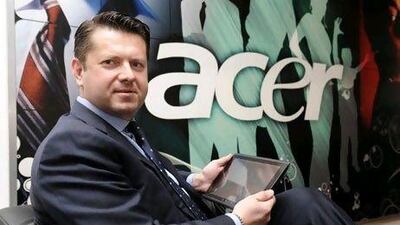Walk through any computer showroom and you will see a dizzying array of computers. Yet only a few brand names, such as Apple, Sony and Toshiba, stand out.
All three are distinctive and desirable to shoppers after successful worldwide marketing and advertising campaigns.
It is this high-profile recognition the Acer Group would love to have.
The Taiwanese company is a technological giant with estimated revenue topping US$19.9 billion (Dh73.08bn) last year, due to thriving PC and notebook sales.
But according to Giuseppe Mastandrea, the new director for the Middle East, Turkey and Africa at Acer, there is still confusion about how the group's brands are perceived by customers.
That is hardly surprising, as the company's family of products includes Acer, Gateway, Packard Bell and eMachines.
"Acer Group has grown very fast and enjoyed nice results," Mr Mastandrea says. "But now it needs to focus on building brands, something extremely important in the region."
The group has experienced extraordinary growth since Stan Shih founded it under the name Multitech in 1976 as a distributor of electronics components.
Moving into the budget end of the PC and notebook sector, the company has eaten into the market share of established players such as HP and Dell. Last year, Acer consolidated its position in the top five of PC and notebook makers by acquiring the popular US tech companies Gateway and Packard Bell.
This was part of the company's expansion plans but the group's PC sales worldwide in this year's first quarter have been down 10 per cent compared with the previous three months, and slower growth is predicted this year as more consumers switch to tablets.
So there are challenges ahead for Acer as it tries to transform from an imitator of beige-box PCs to a high-tech innovator with a distinctive brand. Mr Mastandrea recognises this. He has worked for the group for almost 20 years and will play a key role in rebranding the company, particularly in the Middle East.
Before taking his new job, Mr Mastandrea was in charge of Acer's global marketing and branding team. One of his key duties was to mastermind the company's multi-brand strategy after Gateway and Packard Bell were incorporated.
"The potential is really huge in the Middle East," he says. "But we have to grow."
Moving into the tablet market, which is dominated by Apple's iPad, is key to that strategy. This year, Acer will roll out several models of tablets and join Samsung and the BlackBerry maker Research In Motion (RIM) in trying to peg back Apple.
When Steve Jobs unveiled the iPad 2 this year, the Apple chief executive talked about the "post-PC era", hinting at the slow death of the personal computer, a core product for Acer.
While Mr Mastandrea has been quick to embrace the tablet revolution, he reckons the darling of computer geeks has got it wrong. "I disagree with Steve Jobs," he says with a chuckle, adding there will always be a market for PCs.
But for Acer to expand further, Mr Mastandrea concedes it will have to grab a slice of the tablet market, with its projected sales of 50 million units this year.
The big question is, how will Acer stand out from Apple, Samsung, Motorola, RIM, LG, ViewSonic and Huawei in a crowded marketplace?
"We're going to launch a big range of products, including 5-inch, 7-inch, 10-inch," Mr Mastandrea says. "There will be Acer tablets with different operating systems, including Android, Windows and MeeGo."
Choice will be the buzzword of the group's global strategy, and the ability to deliver the right products on time. "First you need to have the product," he says, hinting that some of Acer's rivals may have shown tablets but have not yet delivered them to the market.
On a more serious note, Mr Mastandrea concedes the growing tablet market could affect notebook sales, a key driver of Acer's revenue.
"It's too early to really tell but it is not something we see in the Middle East for the moment," he says, adding that he does not expect tablets to replace notebooks.
But Acer will copy Apple's strategy in marketing the iPad. Not content with just selling hardware, the California technology giant has also introduced value-added services such as iTunes.
Acer is banking on Alive, a similar service. Basically an online store for music, films and applications, Alive is available only in the UK and Italy. But Mr Mastandrea says Acer expects its Middle East customers will be able to buy digital content by the end of the year.
As for the political turmoil that has hit parts of the Mena region, he says that should not affect future sales: "Looking at our results for the first quarter, we have not been badly affected."
For Mr Mastandrea, a bigger challenger lies ahead as he enters the branding wars and the fight for tablet supremacy. It is a battle Acer cannot afford to lose.

